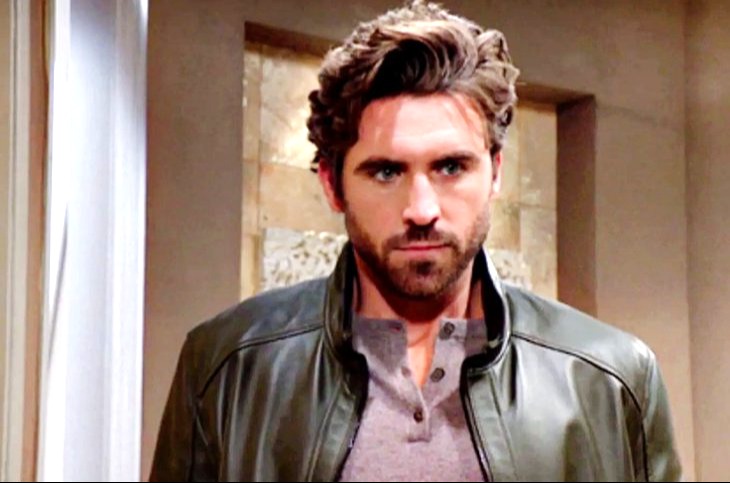The opulent mansion in Nice, meant for healing and celebration, has been stained by an unspeakable horror. What began as an exclusive reunion for Genoa City’s elite has devolved into a nightmare, with Damian Cain’s brutal death leaving behind a trail of grief, suspicion, and terrifying questions that threaten to tear apart the very fabric of their lives.
Damian’s sudden, unnatural death cast an immediate, suffocating pall over the lavish affair. His abrupt departure ignited an explosion of torment and conflict, reverberating through Genoa City. From blood relatives to fleeting acquaintances, all are now caught in an inescapable spiral of guilt and consequence. Dr. Nate Hastings was forced to confront humanity’s crushing helplessness against fate’s cruel hand, his grief magnified by the agonizing suffering of Amy Lewis, Damian’s mother. Amy, battling leukemia, had just reconciled with her son only to face his brutal demise. Consumed by self-blame, her condition deteriorated daily, rejecting comfort and seeking refuge in the past.

Meanwhile, in Nice, the investigation descended into chaos. Chance Chancellor, initially an observer, found himself ensnared in a murder inquiry outside his jurisdiction. He was squeezed between Damian’s grieving family and Genoa City’s powerful, his duty clashing with his desire to protect loved ones. Audra Charles, with her sharp intellect, became a reluctant pillar of support, yet every lead in the case seemed to loop back to her, hinting at unspoken, dangerous secrets.
Back in Genoa City, Damian’s death sparked a fierce debate about responsibility and justice. Nate, despite his profound grief, clung to scientific sobriety, dedicating himself to finding the killer alongside Chance and Amy. Every piece of evidence from Nice felt like a knife twisting in his soul, forcing him to confront his own past mistakes. Amy’s pain became his driving force, pushing him deeper into the investigation, ignoring the lurking threats.
Cain Ashby’s name echoed through the investigation’s early stages. His tumultuous past made him the immediate prime suspect. Every trace, every question, pointed back to him, threatening his reputation, freedom, and even his life. The tense relationship between Cain and Damian, coupled with whispers of old motives and revenge, swung public opinion decisively against him. Genoa City, already suffocating under scandals, grew even darker. As the investigation stagnated, whispers turned into shouts, dissecting Cain’s true motives and the tangled webs of powerful families.
The conflicts escalated, pushing each character to their breaking point. Amy, consumed by loss; Nate, burdened by responsibility; Audra, clutching deadly secrets; Chance, trapped in a maze of lies – all haunted by the obsession with truth. They faced agonizing choices: protect loved ones at all costs, or sacrifice personal feelings for justice. With each passing day, the case grew more convoluted. Witnesses altered testimonies, and evidence unveiled a truth far more horrifying than imagined. Those who once believed they controlled everything now succumbed to doubt and fear. Nate and Amy, once victims, emerged as a driving force, rallying Genoa City to demand justice. Their pain became the collective voice of countless others caught in this vortex.
Cain’s ultimate fate remained an open wound. Was he the true culprit, or a pawn in a grander conspiracy? One truth was undeniable: after Damian’s death, none of them would ever be the same. The scars of this tragedy, the torment of the past, and the chilling fear of the future would haunt Genoa City for years. For Amy, the arduous journey of healing, both physical and spiritual, had only just begun.
The party atmosphere transformed into the stage for the year’s greatest tragedy. Damian’s wine, meticulously selected for its rare vintage, became a poison. Dizziness came first, then blurred movement. Damian collapsed from a blade to his back, the killer vanished. Cain, also drugged, stood frozen. Someone had set him up, counting on his paranoia and instinct to protect himself.
Cain’s own surveillance system, a double-edged sword, was compromised. Footage was incomplete: static, black screens, blurred images. Someone had wiped data or infiltrated remotely. Terrified of being framed, Cain hid this, but every secret etched guilt into his posture. The only intact clip showed a shadowy, hooded figure, too obscured to identify. What gnawed at Cain was the growing possibility the killer knew the cameras, striking precisely in a blind spot. A 12-minute offline gap in the hallway footage was long enough to kill, clean, and frame Cain without fingerprints.





